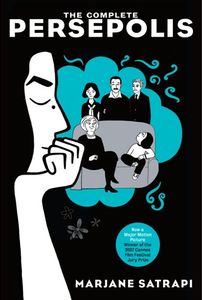
The EnCore book club met this month to discuss the popular graphic novel Persepolis, by Iranian artist Marjane Satrapi. It was an unusual choice for the group for a variety of reasons: the book is a memoir of a young girl growing up in revolutionary Iran, it was originally written in French, and it was published as a graphic novel. By choosing this medium, Satrapi tells her story as much through her black and white, Matisse-like artwork as she does through her words.
The conversation veered from the nature of comics as art to political realities and fiction. Would Satrapi’s story have beeen better told in the form of a conventional book? Would Iran’s cultural story? What do we in America think about the fact that much of the political and moral vitriol many Iranians feel towards the West is due to the role America and Britain had in establishing the Shah’s regime early in the 20th century? Is Persepolis less valuable for its focus on art and the individual over historical accuracy, or is that an irrelevant point?
Satrapi herself has been quoted as saying that the facts of the story, as we read it, must be seen exclusively from the perspective of her young self at the time. For example, some minor plot details are actually historically inaccurate, because they reflect the strongest rumors that were circulating at that time (e.g. which political groups were in charge of certain attacks on buildings or protest crowds). Narrow in scope or not, Satrapi’s background and personal experience (coming from a “Westernized” and cultivated intellectual family, living through the Iraq-Iran war, studying abroad, and returning to her homeland) offer a unique, funny, and compelling glimpse into the aftermath and ongoing consequences of the Iranian Cultural Revolution.
EnCore held a screening of the award-winning film Persepolis (2007) on February 20th at the Kenmore Classroom Building, to further explore how this unconventional book was adapted to the unconventional medium of animation, and what was gained or lost as a result.
Does this sound like a discussion you would have wanted to take part in? EnCore will continue its Revolutionary Theme next month with Former People, a look at the fall of the Russian aristocracy after the 1917 Bolshevik revolution. Regardless of whether you’ve read all, part, or none of the book, we look forward to seeing any Core folks join us on March 6th for another fun discussion.
